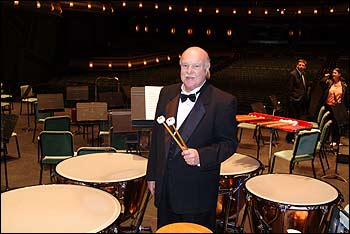
The Dowd Effect
The master musician’s lasting legacy
by Brett Campbell
 |
| Charles Dowd |
Let’s bang the drum slowly for longtime Eugene Symphony timpanist and UO percussion prof Charles Dowd, who died last week. Acclaimed by critics and audiences for his performances at festivals, concerts and in studios around the world and across the U.S., Dowd was even more renowned in the percussion world for contributing to the development of what Evelyn Glennie has called the “instrument of the 20th century” through his nine books, many journal publications and teaching residencies. He was best known here for the scintillating performances of the Oregon and University Percussion Ensembles, which — thanks to Dowd’s irrepressible combination of fun, ferocious precision and forward looking exploration — regularly gave the most exciting and entertaining concerts at the university. Where so many classical concerts are stiff, staid affairs, UO percussion concerts were always an unpredictable delight, with audiences picking up on the students’ joy. Dowd played a major role in solidifying the position of 20th-century percussion composers such as John Cage and Lou Harrison in the repertoire, and shattered the silly barriers between rock and postclassical music by frequently featuring the work of Frank Zappa and others and moving beyond the field’s narrow, self-imposed borders. For all that, his most lasting legacy will lie in the high-standard work of the many students, now teaching and performing across the country, he taught and inspired in a 35 year career of the highest musical contributions to this community. We’ll miss him, but his beat will go on.
It’s a measure of the national respect accorded the UO’s new music duo Beta Collide that their concert on April 13 at Beall Concert Hall will feature works created for the faculty duo (flutist fanstastique Molly Barth and uber-trumpeter Brian McWhorter) by one of the world’s leading composers, Frederic Rzewski, and three of today’s rising compositional stars. Along with a half dozen other top musicians, they’ll be joined by one of the world’s most renowned new music singers, soprano Lucy Shelton, who has premiered more than 100 new works and won praise for her artistry from practically every major music critic. Shelton’s ravishing performance of one her specialties, Arnold Schoenberg’s Pierrot Lunaire, with Barth’s old band, eighth blackbird, at the OJai Festival was one of my most memorable musical experiences last year, thanks both to her vocal chops and her riveting dramatic interpretation. The ear-opening concert features a wild, Dadaist style piece by Stanford composer Mark Applebaum that sports various solo stage antics, a haunting work created for the group by Stephn Vitiello, evocative 20th century modernist classics by Luciano Berio (Sequenza III) and Milton Babbit (Philomel) and the big news: a world premiere by rising young Brooklyn-based composer Justine Chen that offers another take on the Philomel myth. This will certainly be one of the most fascinating concerts of the year.
More new music emanates from the Beall stage April 11 when the excellent faculty violinist and violist Kathryn Lucktenberg leads a quartet of colleagues in a fine program of music by J.S. Bach (one of his splendid solo sonatas), Stravinsky, Faure (Piano Quartet in g minor) and contemporary composer Judith Shatin’s Penelope’s Song, for amplified viola and electronics. And on April 2, Beall features two multiple award winning guitar virtuosos, Francesco Buzzurro of Sicily and USC prof Richard Smith. Their rep covers material from pop (Michael Jackson, Stevie Wonder) to jazz (Joe Zawinul, Chick Corea) to world music and originals.
It’s great to see contemporary music at the Hult Center, too. On April 10, the Eugene Vocal Arts Ensemble will sing one of the most popular recent choral pieces, Leonardo Dreams of His Flying Machine, by the hottest composer in choral music, Eric Whitacre, along with a 20th century masterpiece, Benjamin Britten’s Five Flower Songs, and music from the Renaissance forward. This is an excellent chance to see EVAE cover some of the highlights of its admirably wide ranging repertoire.
Eugene has been getting a smattering of classical Indian music performers swinging through town in recent months, so world music fans should welcome the arrival of sarod master Shankar Bhattacharyya from Texas. On April 11 at the Unitarian Universalist Church (477 E. 40th), he and Doug Scheuerell, the tabla player who teaches at the UO and has often performed there, will honor the legacy of one of the 20th century’s greatest musicians, Ali Akbar Khan, who died last year after decades of bringing the mesmerizing sound of sarod (the beautiful multi-string lute from Northern India) with a concert of Hindustani classical music.